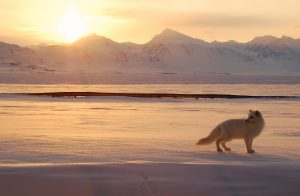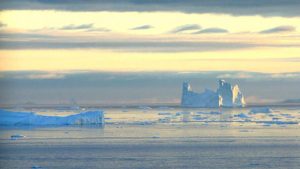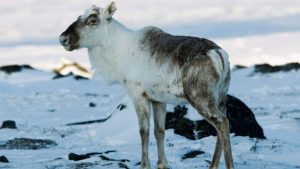Huge sea ice loss changing entire arctic ecosystem
The massive loss of sea ice in the arctic is happening so fast that species there cannot possibly evolve fast enough to adapt, says Ian Stirling, an adjunct professor at the University of Alberta and one of the co-authors of a study recently published in the journal Science. As a result, there will be winners and losers in the rapidly changing ecosystem.
“The loss of over two million square kilometers of Arctic sea ice since the end of the last century represents a stunning loss of habitat,” says the report which is a review of dozens of recent studies on the Arctic. Half of the sea ice has melted in only a few decades.
Sea ice is a disappearing habitat
“This is a really major change,” says Stirling, “because sea ice is a habitat in itself, sort of like the soil to the forest. If you take away the soil you don’t have a forest. If you take away the sea ice you don’t have the whole ecosystem of animals and plants that depends on it and is a very vibrant ecosystem at the moment.”
Polar bears are already suffering since they depend on sea ice from which they hunt. Foxes which usually follow and eat left overs over kills are affected.
Orca whales should benefit as they will be able to move into territories that become free of ice and they will encroach on the feeding grounds of harp seals and beluga whales.
Some foxes may be less likely to get rabies which is believed to be transmitted from Russian foxes that will no longer be able to travel by ice. A decrease in travel possibilities may reduce the gene pools of several types of animals.
Sea ice is home for algae and plankton, which together produce 57 per cent of all the food in northern oceans. When the ice shrinks, that changes the timing of their growth and their availability since they sink down to the sea floor.
“Adaptation is not an option”
“There’s a very recent paper out…(that)…has gone into looking at the rates at which animal species can adapt,” says Stirling, “and it’s very, very clear that the time over which these kinds of changes are taking place now are a very small fraction of the time it takes for these kinds of species to evolve. So adaptation is not an option.”
That means there will be big changes in the kinds of species in the arctic.
As the oceans warm due to a loss of sea ice, there will also be a warming of permafrost as far as 1,500 kilometers inland. That will lead to earlier spring growth, disrupting the timing for caribou herds seeking to feed their young. Shrubs are spreading north and caribou cannot eat them.
“We don’t have a lot of lead time”
Climate change is happening fast in the north, but it is also affecting the rest of the world, notes Stirling. “I’m personally quite concerned…Humans caused the problem basically. Humans could solve the problem if they collectively got organized enough. It’s an international problem. We need everybody on board and very soon. We don’t have a lot of lead time according to most of the modellers.”
TO LISTEN TO THE FULL REPORT, CLICK HERE






